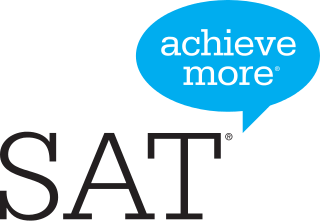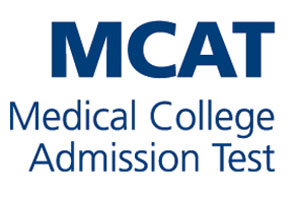
The SAT is a standardized test widely used for college admissions in the United States. Since its debut in 1926, its name and scoring have changed several times. For much of its history, it was called the Scholastic Aptitude Test and had two components, Verbal and Mathematical, each of which was scored on a range from 200 to 800. Later it was called the Scholastic Assessment Test, then the SAT I: Reasoning Test, then the SAT Reasoning Test, then simply the SAT.
Advanced Placement (AP) is a program in the United States and Canada created by the College Board. AP offers undergraduate university-level curricula and examinations to high school students. Colleges and universities in the US and elsewhere may grant placement and course credit to students who obtain high scores on the examinations. The AP curriculum for each of the various subjects is created for the College Board by a panel of experts and college-level educators in that academic discipline. For a high school course to have the designation, the course must be audited by the College Board to ascertain that it satisfies the AP curriculum as specified in the Board's Course and Examination Description (CED). If the course is approved, the school may use the AP designation and the course will be publicly listed on the AP Course Ledger.

A quiz is a form of game or mind sport in which players attempt to answer questions correctly on one or several specific topics. Quizzes can be used as a brief assessment in education and similar fields to measure growth in knowledge, abilities, or skills. They can also be televised for entertainment purposes, often in a game show format.
The Graduate Record Examinations (GRE) is a standardized test that is an admissions requirement for many graduate schools in the United States and Canada and a few other countries. The GRE is owned and administered by Educational Testing Service (ETS). The test was established in 1936 by the Carnegie Foundation for the Advancement of Teaching.

Multiple choice (MC), objective response or MCQ is a form of an objective assessment in which respondents are asked to select only correct answers from the choices offered as a list. The multiple choice format is most frequently used in educational testing, in market research, and in elections, when a person chooses between multiple candidates, parties, or policies.
A concept inventory is a criterion-referenced test designed to help determine whether a student has an accurate working knowledge of a specific set of concepts. Historically, concept inventories have been in the form of multiple-choice tests in order to aid interpretability and facilitate administration in large classes. Unlike a typical, teacher-authored multiple-choice test, questions and response choices on concept inventories are the subject of extensive research. The aims of the research include ascertaining (a) the range of what individuals think a particular question is asking and (b) the most common responses to the questions. Concept inventories are evaluated to ensure test reliability and validity. In its final form, each question includes one correct answer and several distractors.

Joint Entrance Examination – Advanced (JEE-Advanced), is an academic examination held annually in India. It is organised by one of the seven zonal IITs under the guidance of the Joint Admission Board (JAB) on a round-robin rotation pattern for the qualifying candidates of the JEE-Main. It was used to be the sole prerequisite for admission to the Indian Institutes of Technology bachelor's programs before the introduction of UCEED, Online B.S. and Olympiad entries, but seats through these new mediums are very low.

Daniel Manus Pinkwater is an American author of children's books and young adult fiction. His books include Lizard Music, The Snarkout Boys and the Avocado of Death, Fat Men from Space, Borgel, and the picture book The Big Orange Splot. He has also written an adult novel, The Afterlife Diet, and essay collections derived from his talks on National Public Radio.
Pearson Education is a British-owned education publishing and assessment service to schools and corporations, as well for students directly. Pearson owns educational media brands including Addison–Wesley, Peachpit, Prentice Hall, eCollege, Longman, Scott Foresman, and others. Pearson is part of Pearson plc, which formerly owned the Financial Times. It claims to have been formed in 1840, with the current incarnation of the company created when Pearson plc purchased the education division of Simon & Schuster from Viacom and merged it with its own education division, Addison-Wesley Longman, to form Pearson Education. Pearson Education was rebranded to Pearson in 2011 and split into an International and a North American division.
Advanced Placement (AP) English Language and Composition is a course and examination offered by the College Board as part of the Advanced Placement Program.
Advanced Placement (AP) Spanish Language and Culture is a course and examination offered by the College Board in the United States education system as part of the Advanced Placement Program.
Advanced Placement (AP) Statistics is a college-level high school statistics course offered in the United States through the College Board's Advanced Placement program. This course is equivalent to a one semester, non-calculus-based introductory college statistics course and is normally offered to sophomores, juniors and seniors in high school.
Advanced Placement (AP) Environmental Science is a course and exam offered by the American College Board as part of the Advanced Placement Program to high school students interested in the environmental and natural sciences. AP Environmental Science was first offered in the 1997–1998 school year.

Alan Mendelsohn, the Boy from Mars is a novel by Daniel Pinkwater, published in 1979.
The SAT Subject Test in World History was the name of a one-hour multiple choice test given on World History by the College Board. A student chose to take it depending on a college's entrance requirements. Until 1994, the SAT Subject Tests were known as Achievement Tests; and from 1995 until January 2005, they were known as SAT IIs. The SAT World History was not taken frequently. Fewer than 17,000 students in 2015 took this test, compared to the over-110,000 students who took the United States History Subject Test. On January 19 2021, the College Board discontinued all SAT Subject tests, including the SAT Subject Test in World History. This was effective immediately in the United States, and the tests were to be phased out by the following summer for international students. This was done as a response to changes in college admissions due to the impact of the COVID-19 pandemic on education.

An examination or test is an educational assessment intended to measure a test-taker's knowledge, skill, aptitude, physical fitness, or classification in many other topics. A test may be administered verbally, on paper, on a computer, or in a predetermined area that requires a test taker to demonstrate or perform a set of skills.

The Medical College Admission Test is a computer-based standardized examination for prospective medical students in the United States, Australia, Canada, and the Caribbean Islands. It is designed to assess problem solving, critical thinking, written analysis and knowledge of scientific concepts and principles. Before 2007, the exam was a paper-and-pencil test; since 2007, all administrations of the exam have been computer-based.
Leonie Haimson is the founder and executive director of Class Size Matters, a non-profit organization based in New York City that advocates nationally for smaller classes. The New York Times education editor, Alison Mitchell, acknowledged her as New York City's “leading proponent of smaller classes.” She has also been active in other civic aspects of school education.
Advanced Placement (AP) International English Language is an AP Examinations course managed by Educational Testing Service (ETS) with the sponsorship of the College Board in New York. It is designed for non-native speakers to prepare for studying in an English-speaking university, particularly in North America. The course also gives students a chance to earn college credit. The three-hour exam assesses four language skills: listening, reading, writing, and speaking. The test paper has two sections: multiple-choice questions and free-response questions. APIEL committee consists of high school and university English teachers from Belgium, China, France, Germany, Switzerland, and the United States.

In the United States, those seeking to become lawyers must normally pass a bar examination before they can be admitted to the bar and become licensed to practice law. Bar exams are administered by states or territories, generally by agencies under the authority of state supreme courts. Almost all states use some examination components created by the National Conference of Bar Examiners (NCBE). Forty-one jurisdictions have adopted the Uniform Bar Examination (UBE), which is composed entirely of NCBE-created components.









